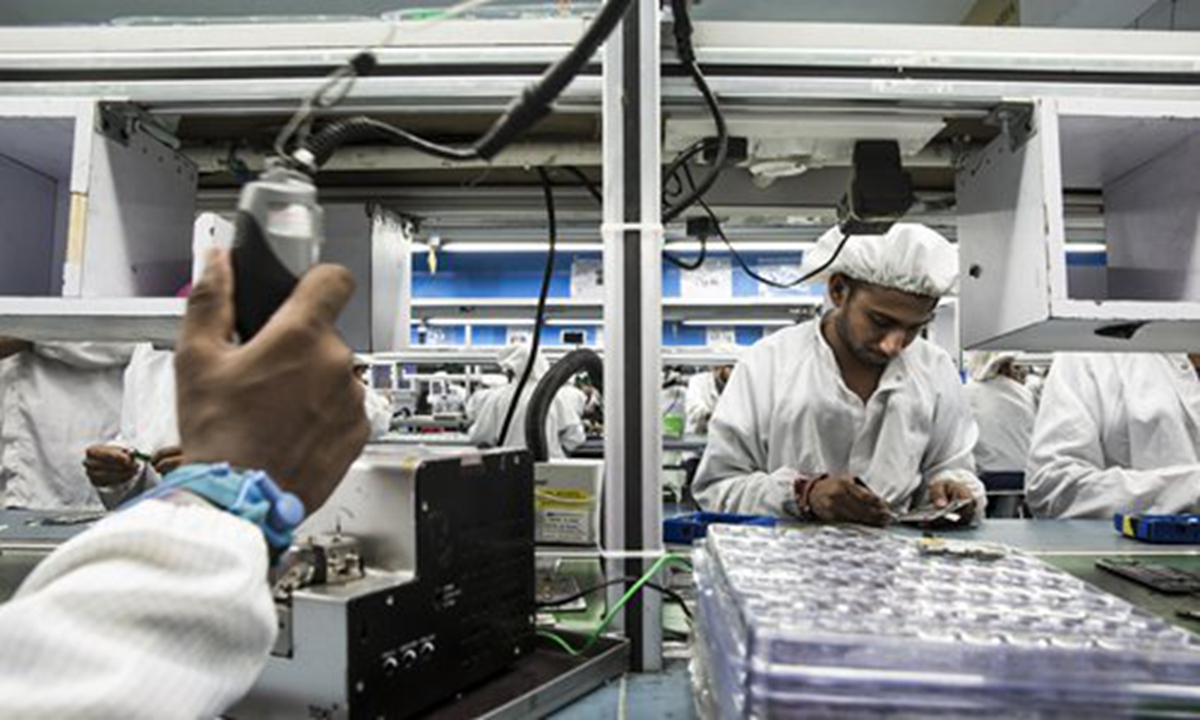Economic decoupling from China will backfire for India: experts
Source: Global Times Published: 2020/8/13 0:41:02

A view of a production line of a smartphone factory in India. Photo: VCG
India might not be able to fulfill its ambition of increasing manufacturing output to 25 percent of GDP by 2025 if the country continues to boycott Chinese products, experts said.
India is considering hiking customs duties on 20 kinds of products including laptops, cameras and textiles, large volumes of which come from China, as part of its latest move to restrict imports from China, the Times of India reported on Tuesday.
This comes after Nitin Gadkari, India's minister for small and medium enterprises, said on Monday that the Indian government plans to promote the production of certain products where China has a large share of the global market, as part of efforts to reduce imports and push exports.
The latest move in India's recent measures on trade, investment and market access is an attempt to decouple with China following the border clash, but it will backfire for India, experts said.
It is wrong and dangerous for India to continue indulging in its current anti-China policy, Zhao Gancheng, director of the Center for Asia-Pacific Studies at the Shanghai Institute for International Studies, told the Global Times Wednesday.
"Given the deep trade ties between the two countries, whether India can completely decouple from Chinese products and produce them on its own remains in doubt," he said.
Despite the calls to "boycott China," India's imports from China, its second-largest trading partner, rose to $5.6 billion in July, climbing for the second straight month, according to media reports.
In 2019, Chinese goods made up 18 percent of India's imports. The five main import categories are electronic and mechanical products, chemical products, cheap materials, plastics and rubber, and textiles according to data compiled by the Global Times in July.
As much as 80 percent of the products in an Indian household, from TVs to mobile phones, are made in China, Shamim Zakaria, an Indian national who has been working in China, told the Global Times Wednesday.
"If India hikes the duties on Chinese products it will be a blow for middle class families who rely so much on Chinese items, particularly the electronics," he said, adding that his father and sister back in India use Huawei and Xiaomi smartphones.
"If India wants to be self-sufficient, it needs a lot of planning and investment in factories, which is a long-term process. A sudden boycott of Chinese products would leave Indian people with no alternatives," he said.
Data from Moneycontrol Research showed that out of India's imports, 70 percent of electronic components and APIs, 45 percent of consumer durables, 40 percent of leather goods and 20 percent of auto components come from China.
"India does not have the ability to replace China to produce these products by itself and imports from other countries would also be too expensive," Zhao said.
He predicted that if India continues to shut the door for Chinese products, it may seriously hinder India's ambitious goal of becoming a global manufacturing hub.
The Indian government launched the Make in India initiative on September 25, 2014, a program that aims to raise the contribution of the manufacturing sector to 25 percent of GDP by the year 2025, The Hindu reported.
"China plays a very important role in the Indian manufacturing industry. If India continues to boycott Chinese products such as electro-mechanical products, this goal may not be achieved even by 2035," Zhao said.
Posted in: ECONOMY